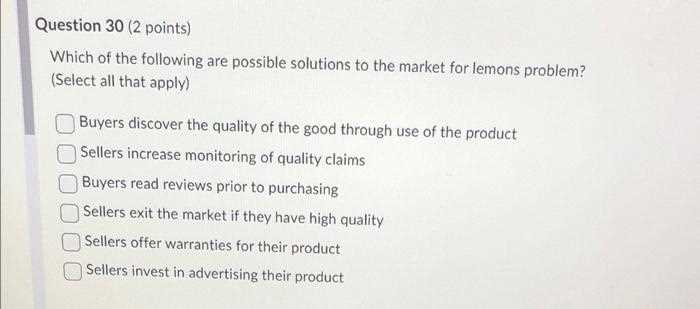The Concept of the Lemons Problem
The Lemons Problem is a concept in economics that refers to the issue of information asymmetry between buyers and sellers in a market. It was first introduced by George Akerlof in his 1970 paper “The Market for Lemons: Quality Uncertainty and the Market Mechanism”.
Information asymmetry occurs when one party in a transaction has more information than the other party. In the case of the Lemons Problem, sellers have more information about the quality of their products than buyers. This creates a situation where buyers are uncertain about the true value of the product they are purchasing.
As a result of this uncertainty, buyers may be unwilling to pay a premium price for a product that could potentially be of low quality. This can lead to a decrease in demand for high-quality products and an increase in demand for low-quality products, as buyers are more willing to take a chance on a cheaper product.
There are several effective solutions to the Lemons Problem that have been proposed by economists. These include mechanisms such as warranties, reputation systems, and third-party certification. These solutions aim to reduce information asymmetry and increase buyer confidence in the quality of the products being sold.
Impact of the Lemons Problem on Markets

One of the major impacts of the Lemons Problem on markets is a decrease in the overall quality of goods and services available. When buyers are unable to differentiate between high-quality and low-quality products, sellers have less incentive to produce and offer high-quality goods. This can lead to a situation where the market becomes flooded with low-quality goods, as sellers are able to sell them at the same price as high-quality goods.
Furthermore, the Lemons Problem can also lead to a decrease in market efficiency. When buyers are uncertain about the quality of goods, they may be less willing to make purchases, leading to a decrease in demand. This can result in a decrease in overall market activity and economic growth.
In addition, the Lemons Problem can also have a negative impact on trust and reputation in the market. When buyers consistently encounter low-quality goods, they may become skeptical of all sellers and may be less willing to trust future transactions. This can lead to a breakdown in trust between buyers and sellers, making it more difficult for high-quality goods to gain recognition and market share.
Overall, the Lemons Problem has significant implications for markets, including a decrease in overall quality, a decrease in market efficiency, and a breakdown in trust. It is important for policymakers and market participants to understand and address the Lemons Problem in order to promote a healthy and efficient market environment.
Effective Solutions to the Lemons Problem
1. Quality Certification
One effective solution to the Lemons Problem is the implementation of quality certification systems. These systems involve independent third-party organizations that assess and certify the quality of goods or services. By providing a seal of approval or a certification mark, these organizations help to reduce the information asymmetry between buyers and sellers. Buyers can rely on these certifications to make informed decisions and trust that they are purchasing high-quality goods.
2. Reputation Systems

Reputation systems can also be an effective solution to the Lemons Problem. Online platforms and marketplaces often use reputation systems to gather feedback and ratings from buyers and sellers. These ratings and reviews help to establish trust and provide valuable information about the quality of goods or services. Sellers with a good reputation are more likely to attract buyers, while those with a poor reputation are likely to be avoided. This encourages sellers to maintain high-quality standards and discourages the presence of lemons in the market.
3. Extended Warranties

Offering extended warranties can be another solution to the Lemons Problem. By providing extended warranties, sellers signal their confidence in the quality of their products. Buyers are more likely to trust and purchase goods that come with extended warranties, as it reduces the risk of buying a lemon. This solution helps to overcome the information asymmetry by providing buyers with a form of insurance against potential defects or low-quality goods.
4. Return Policies
Implementing flexible return policies can also address the Lemons Problem. By allowing buyers to return goods within a specified period, sellers demonstrate their commitment to customer satisfaction and the quality of their products. This reduces the risk for buyers and encourages them to make purchases with confidence. Return policies provide a safety net for buyers who may have concerns about the quality of the goods they are purchasing.
Tools and Strategies to Overcome the Lemons Problem
Dealing with the lemons problem requires the use of various tools and strategies to overcome the challenges it presents in markets. Here are some effective solutions:
1. Quality Certification:
One way to address the lemons problem is through quality certification. This involves third-party organizations or agencies certifying the quality and authenticity of products or services. By obtaining a certification, sellers can signal to buyers that their offerings are of high quality and reliable.
2. Reputation Systems:
Reputation systems play a crucial role in overcoming the lemons problem in online marketplaces. These systems allow buyers to rate and review sellers based on their experiences. Positive reviews and high ratings can help build trust and confidence among potential buyers, while negative reviews can serve as a warning sign.
3. Guarantees and Warranties:
Offering guarantees and warranties can help alleviate the concerns of buyers in markets affected by the lemons problem. By providing assurances that products or services will meet certain standards or will be replaced or repaired if they fail to do so, sellers can increase buyer confidence and reduce information asymmetry.
4. Screening and Selection:
Another strategy to overcome the lemons problem is to implement screening and selection processes. This involves carefully evaluating and selecting sellers or products based on certain criteria. By only allowing reputable sellers or high-quality products to participate in the market, the risk of encountering lemons can be minimized.
5. Information Transparency:
Increasing information transparency is essential in combating the lemons problem. Providing detailed and accurate information about products or services can help buyers make informed decisions. This can include specifications, performance data, and any relevant certifications or test results.
6. Escrow Services:
Escrow services can be used to mitigate the risk of fraud and non-performance in transactions affected by the lemons problem. These services act as intermediaries, holding funds until the buyer receives the product or service and is satisfied with its quality. This provides a level of protection for both buyers and sellers.
By employing these tools and strategies, market participants can overcome the challenges posed by the lemons problem and create more efficient and trustworthy markets.

Emily Bibb simplifies finance through bestselling books and articles, bridging complex concepts for everyday understanding. Engaging audiences via social media, she shares insights for financial success. Active in seminars and philanthropy, Bibb aims to create a more financially informed society, driven by her passion for empowering others.
